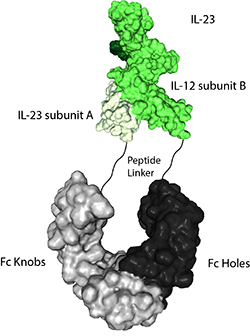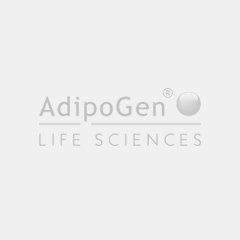
Protein structure of IL-23 (mouse):Fc-KIH (human) (rec.) (Prod. No. AG-40B-0235) containing a single heterodimer.
IL-23 (mouse):Fc InVivoKine(tm)
AG-40B-0235
Protein IDP43432
Product group Proteins / Signaling Molecules
Overview
- SupplierAdipoGen Life Sciences
- Product NameIL-23 (mouse):Fc InVivoKine(tm)
- Delivery Days Customer10
- CertificationResearch Use Only
- Concentration1 mg/ml
- Estimated Purity>95%
- Gene ID16160
- Target nameIl12b
- Target descriptioninterleukin 12b
- Target synonymsIl-12b, Il-12p40, Il12p40, p40, interleukin-12 subunit beta, CLMF p40, IL-12 p40 subunit, IL-12 subunit p40, IL-23 subunit p40, cytotoxic lymphocyte maturation factor 40 kDa subunit, interleukin-12 p40 subunit
- Protein IDP43432
- Protein NameInterleukin-12 subunit beta
- Scientific DescriptionInterleukin-12 (IL-12) family members are heterodimer glycoproteins, composed of two covalently linked subunits, alpha and beta chains. The alpha-subunit consists of IL-23p19, IL-27p28, and IL-12p35, and the beta-subunit includes IL-12p40 and Epstein-Barr virus-induced gene (Ebi3). IL-12 members bind to cognate heterodimeric receptor chains expressed on T cells. This family includes IL-12, IL-23, IL-27, IL-35 and IL-39. IL-12 and IL-23 are predominantly proinflammatory cytokines that contribute key roles in the development of Th1 and Th17 cells, respectively. IL-27 has both pro- and anti-inflammatory properties and is a potent T cell immunomodulator. IL-35, a new member of this family, is a potent inhibitory cytokine produced by natural, thymus-derived regulatory T cell (nTreg) populations. IL-39, the newest member of the IL-12 family, mediates the inflammatory response through the activation of STAT1/STAT3 signaling pathway. These IL-12 family members link innate immunity with the development of adaptive immunity and are also important for regulating T cell responses. Interleukin-23 (IL-23) is composed of the IL-12 p40 chain covalently linked to p19, a chain related to the IL-12 p35 subunit. IL-23 signals through the IL-23 receptor complex, which is composed of the IL-12Rbeta1 chain and a gp130-like chain, IL-23R. Triggering of the IL-23 receptor complex leads to the activation of Tyk2, Jak2 and STAT1, 3 and 4. IL-23 induces IFN-gamma production, Th1 cell differentiation and activation of the antigen-presenting functions of dendritic cells. IL-23 induces autoimmune inflammation and thus may be responsible for autoimmune inflammatory diseases and important for tumorigenesis. The IL-23 (mouse):Fc InVivoKine™ is produced by using two different vectors, one encoding for the IL-23A/p19:Fc Knobs sequence (synthesizing a protein of 55kDa) and one encoding for the IL-12B/p40:Fc Holes sequence (synthesizing a protein of 75kDa). Both vectors transfected into CHO cells produce both Fc molecules (Knobs-into-Holes technology; J.B. Ridgway, et al.; Protein Eng. 9, 617 (1996)) required for dimerization and for secretion of the final protein IL-23 (mouse):Fc InVivoKine™. InVivoKines™ are a new generation of recombinant fusion proteins for immunotherapeutic, preclinical and translational in vivo research, developed and manufactured by AdipoGen Life Sciences. - InVivoKines™. Recombinant protein. IL-23A/p19 (aa 22-196) (mouse):Fc Knobs and IL-12B/p40 (aa 23-335) (mouse):Fc Holes form the IL-23 (mouse):Fc-KIH (human) using the Knobs-into-Holes technology (see reference: J.B. Ridgway, et al.; Protein Eng. 9, 617 (1996)). Source: CHO cells. Lyophilized. Contains PBS Interleukin-12 (IL-12) family members are heterodimer glycoproteins, composed of two covalently linked subunits, alpha and beta chains. The alpha-subunit consists of IL-23p19, IL-27p28, and IL-12p35, and the beta-subunit includes IL-12p40 and Epstein-Barr virus-induced gene (Ebi3). IL-12 members bind to cognate heterodimeric receptor chains expressed on T cells. This family includes IL-12, IL-23, IL-27, IL-35 and IL-39. IL-12 and IL-23 are predominantly proinflammatory cytokines that contribute key roles in the development of Th1 and Th17 cells, respectively. IL-27 has both pro- and anti-inflammatory properties and is a potent T cell immunomodulator. IL-35, a new member of this family, is a potent inhibitory cytokine produced by natural, thymus-derived regulatory T cell (nTreg) populations. IL-39, the newest member of the IL-12 family, mediates the inflammatory response through the activation of STAT1/STAT3 signaling pathway. These IL-12 family members link innate immunity with the development of adaptive immunity and are also important for regulating T cell responses. Interleukin-23 (IL-23) is composed of the IL-12 p40 chain covalently linked to p19, a chain related to the IL-12 p35 subunit. IL-23 signals through the IL-23 receptor complex, which is composed of the IL-12Rbeta1 chain and a gp130-like chain, IL-23R. Triggering of the IL-23 receptor complex leads to the activation of Tyk2, Jak2 and STAT1, 3 and 4. IL-23 induces IFN-gamma production, Th1 cell differentiation and activation of the antigen-presenting functions of dendritic cells. IL-23 induces autoimmune inflammation and thus may be responsible for autoimmune inflammatory diseases and important for tumorigenesis. The protein IL-23 (mouse):Fc-KIH (human) (rec.) is produced by using two different vectors, one encoding for the IL-23A/p19:Fc Knobs sequence (synthesizing a protein of 55kDa) and one encoding for the IL-12B/p40:Fc Holes sequence (synthesizing a protein of 75kDa). Both vectors transfected into CHO cells produce both Fc molecules (Knobs-into-Holes technology; J.B. Ridgway, et al.; Protein Eng. 9, 617 (1996)) required for dimerization and for secretion of the final protein IL-23 (mouse): Fc-KIH (human) (rec.).
- Storage Instruction-20°C,2°C to 8°C
- UNSPSC41116120
- SpeciesMouse



